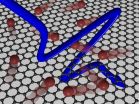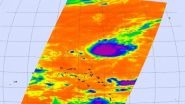(Press-News.org) Researchers have discovered a new technique to enhance brain excitability that could improve physical performance in healthy individuals such as athletes and musicians.
The technique could also improve treatments for neurological and neuropsychological conditions such as stroke, depression and chronic pain.
The idea of stimulating different parts of the brain with electricity may sound futuristic, but these types of treatments have a remarkably long history. Early physicians and scientists such as Claudius Galen (the Roman physician) and Avicenna (the Persian physician) did not understand exactly why electrical therapy (using torpedo fish) was effective, but they did recognise that it could be used to non-invasively treat a number of illnesses such as joint pain, headaches and epilepsy.
Current treatment methods used are transcranial direct current simulation (tDCS) - which is application of a low intensity direct (constant) current between two electrodes on the head, and transcranial alternating current simulation (tACS) - which sees a constant electrical current flow back and forth.
The treatments are favoured, as they are non-invasive with no or minimal side effects.
In 2013, Dr Shapour Jaberzadeh and his group, from the Department of Physiotherapy at Monash University, discovered a new technique that compared to conventional tDCS, significantly increases the brain excitability.
"This treatment, which we called transcranial pulsed current stimulation (tPCS) is a non-constant form of stimulation with "on" and "off" periods - or pulsing - between the two electrodes," Dr Jaberzadeh said.
"We discovered that this new treatment produced larger changes in the brain and that the interval between pulses also had an effect. The shorter the interval between pulses the larger the excitability effect in the brain."
In a new paper published in PLOS ONE today, Dr Jaberzadeh has continued this work and found that the duration of the pulses also make a significant difference in creating brain excitability changes.
"The pulsation of the current induces larger excitability changes in the brain. These changes are larger when we use longer pulses."
"When we learn a task during movement training (for example playing the piano), gradually our performance gets better. This improvement coincides with enhancement of the brain excitability. Compared to tDCS, our novel technique can play an important role in enhancement of the brain excitability, which may help recipients learn new tasks faster."
Dr Jaberzadeh said the technique had exciting implications for a whole host of conditions in which "enhancement of the brain excitability" has a therapeutic effect. These include priming the effects of repetitive task-specific training for treatment of stroke and other neurological disorders, mental disorders and management of pain.
"Our next step is to investigate the underlying mechanisms for the efficacy of this new technique. This will enable us to develop more effective protocols for application of tPCS in patients with different pathological conditions."
INFORMATION:
A simple, lower-cost new method for DNA profiling of human hairs developed by the University of Adelaide should improve opportunities to link criminals to serious crimes.
The researchers have modified existing laboratory methods and been able to produce accurate DNA profiles from trace amounts at a much higher success rate.
"Technological advancements over the last 10 years have allowed police and forensic scientists to profile crime-scene DNA from ever smaller and more challenging samples collected from fingerprints, skin cells, saliva and hairs," says Associate Professor ...
Scientists, including SFU professor Peter Ruben, have found that sudden death caused by cardiac arrhythmia can be triggered by changes in body temperature. The study is published in the Journal of Physiology.
The soccer player who drops dead in the middle of a game, or the infant who dies during sleep is often a victim of arrhythmia. Sudden cardiac death has several causes, including inheritable mutations in our DNA affecting structure and function of proteins in the heart. Simon Fraser University professor Peter Ruben found when studying the proteins that underlie electrical ...
A recent study looks at why some children put on weight faster than others. The study's goal is to identify factors that can lead to obesity.
Assistant Professor Silje Steinsbekk and Professor Lars Wichstrøm at the Norwegian University of Science and Technology's Department of Psychology are conducting the survey. "We've looked to see if physical activity, television time and appetite traits can explain why some children's body mass index (BMI) increases more than others' do," says Steinsbekk.
At the clinic, most parents have seen the percentile curves on the ...
PHOENIX, Ariz. -- July 15, 2015 -- Researchers at the Translational Genomics Research Institute (TGen) have identified a genetic mutation associated with the appearance of premature aging and severe loss of body fat in children.
TGen's Center for Rare Childhood Disorders found that the appearance of premature aging, a neonatal form of Progeroid syndrome, in a 3-year-old girl was caused by a mutation in the gene CAV1, according to a study published today in the scientific journal PLOS ONE.
The Center for Rare Childhood Disorders was established in 2010 to examine the ...
15 July, 2015, Hoffman Estates, IL - Sodium intake in the U.S. exceeds dietary recommendations and has been identified as a nutrient of public health concern in the Scientific Report of the 2015 Dietary Guidelines Advisory Committee1 due to its link to increased risk of hypertension, heart disease, and stroke2. While authorities continue to call for people to lower their sodium intake, much progress still needs to be made and multiple solutions are necessary to meet the recommended maximum intake of 2,300 milligrams per day for the general population and 1,500 milligrams ...
Mainz/Barcelona. A team of scientists at the Max Planck Institute for Polymer Research (MPI-P) discovered that electrical conduction in graphene on the picosecond timescale - a picosecond being one thousandth of one billionth of a second - is governed by the same basic laws that describe the thermal properties of gases. This much simpler thermodynamic approach to the electrical conduction in graphene will allow scientists and engineers not only to better understand but also to improve the performance of graphene-based nanoelectronic devices.
The researchers found that ...
Researchers at Harvard University and the University of California, San Diego, have developed a new user-friendly resource to accompany the powerful gene editing tool called CRISPR/Cas9, which has been widely adopted to make precise, targeted changes in DNA. This breakthrough has the potential to facilitate new discoveries in gene therapies and basic genetics research. The research was published in the July 13 issue of Nature Methods.
The study describes an approach to simplify a laborious part of the gene editing process using the CRISPR/Cas9 system: choosing the best ...
Sudden unexpected death in epilepsy (SUDEP) is becoming increasingly recognized as a very real and devastating problem in which impaired breathing is thought to play a critical role. Researchers believe breathing may be impaired during and after seizures, without the patient's knowledge.
By using electrical stimulation to activate the amygdala, a group of University of Iowa researchers has identified areas of the human brain in which breathing is controlled and, in some cases, impaired, providing an important insight into SUDEP.
Their study - which marks the first time ...
NASA's Aqua satellite flew over Typhoon Halola in the northwestern Pacific Ocean and captured temperature data on the storm. Satellite data showed that wind shear is affecting the stubborn storm.
NASA's Aqua satellite passed over Halola on July 14 at 20:20 UTC (4:20 p.m. EDT/1:20 p.m. PDT) infrared data from the Atmospheric Infrared Sounder or AIRS instrument that also flies aboard Aqua showed cloud top temperatures were as cold as -63F/-52C. Cloud top temperatures that cold have the ability to drop heavy rainfall.
The Joint Typhoon Warning Center noted that animated ...
High school students who take part in pre-college programs that focus on science are much more likely to pursue higher education and, eventually, careers in science, technology, engineering and medicine - the STEM disciplines.
In a paper published in the Journal of Higher Education Outreach and Engagement, Michigan State University researchers from the National Superconducting Cyclotron Laboratory, the Joint Institute for Nuclear Astrophysics and the College of Education used an MSU program as a case study for why these programs are key to training tomorrow's generation ...


